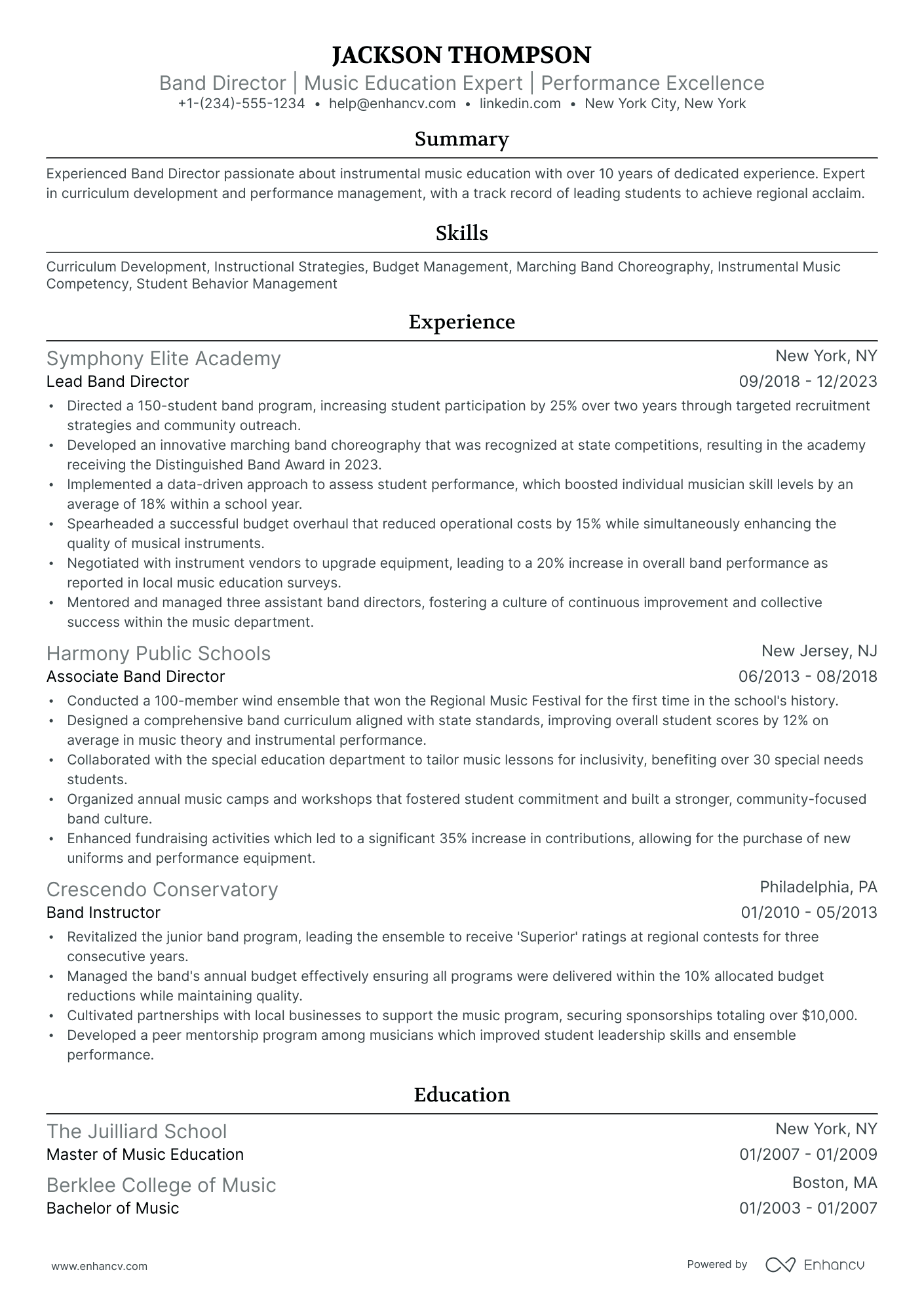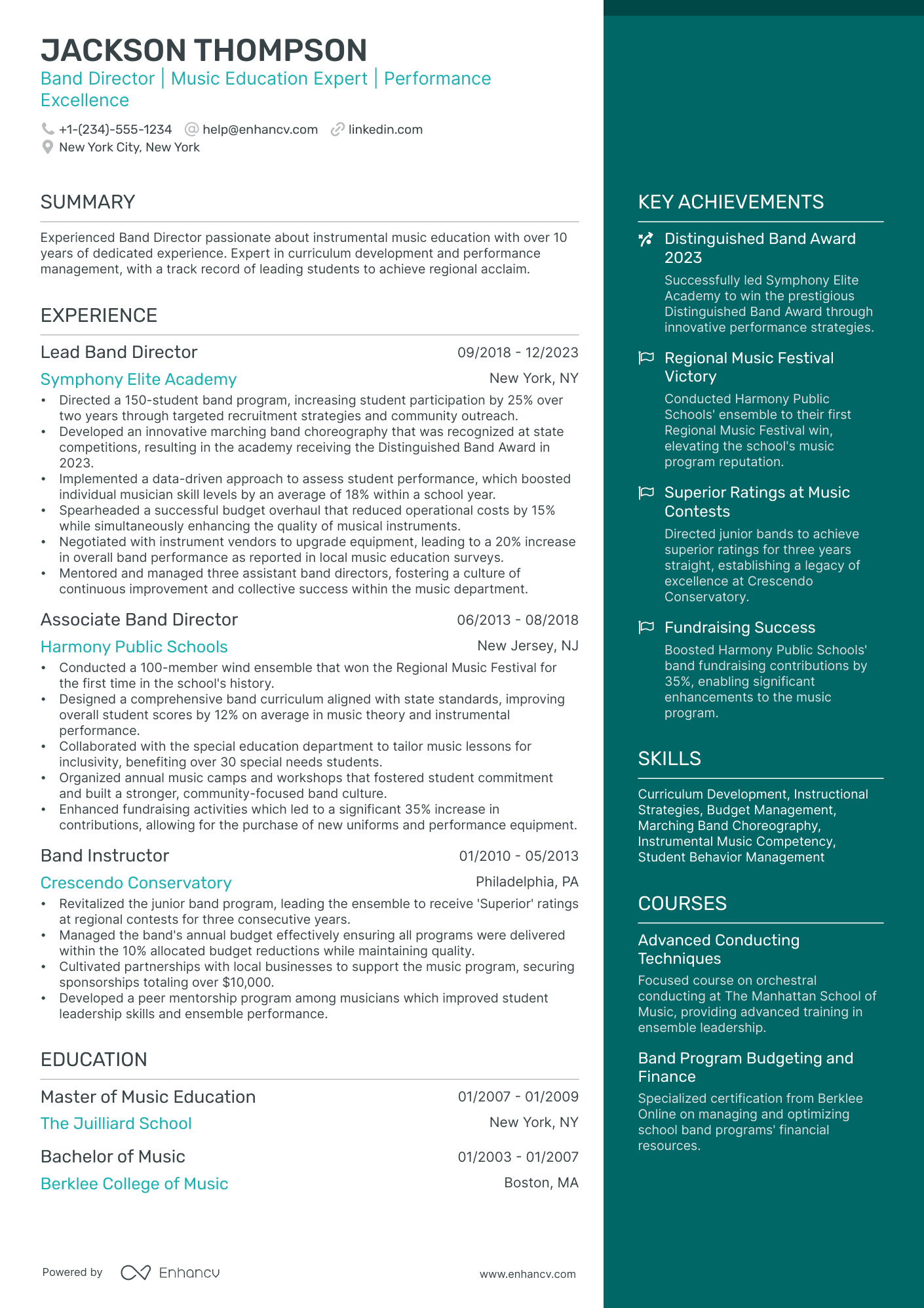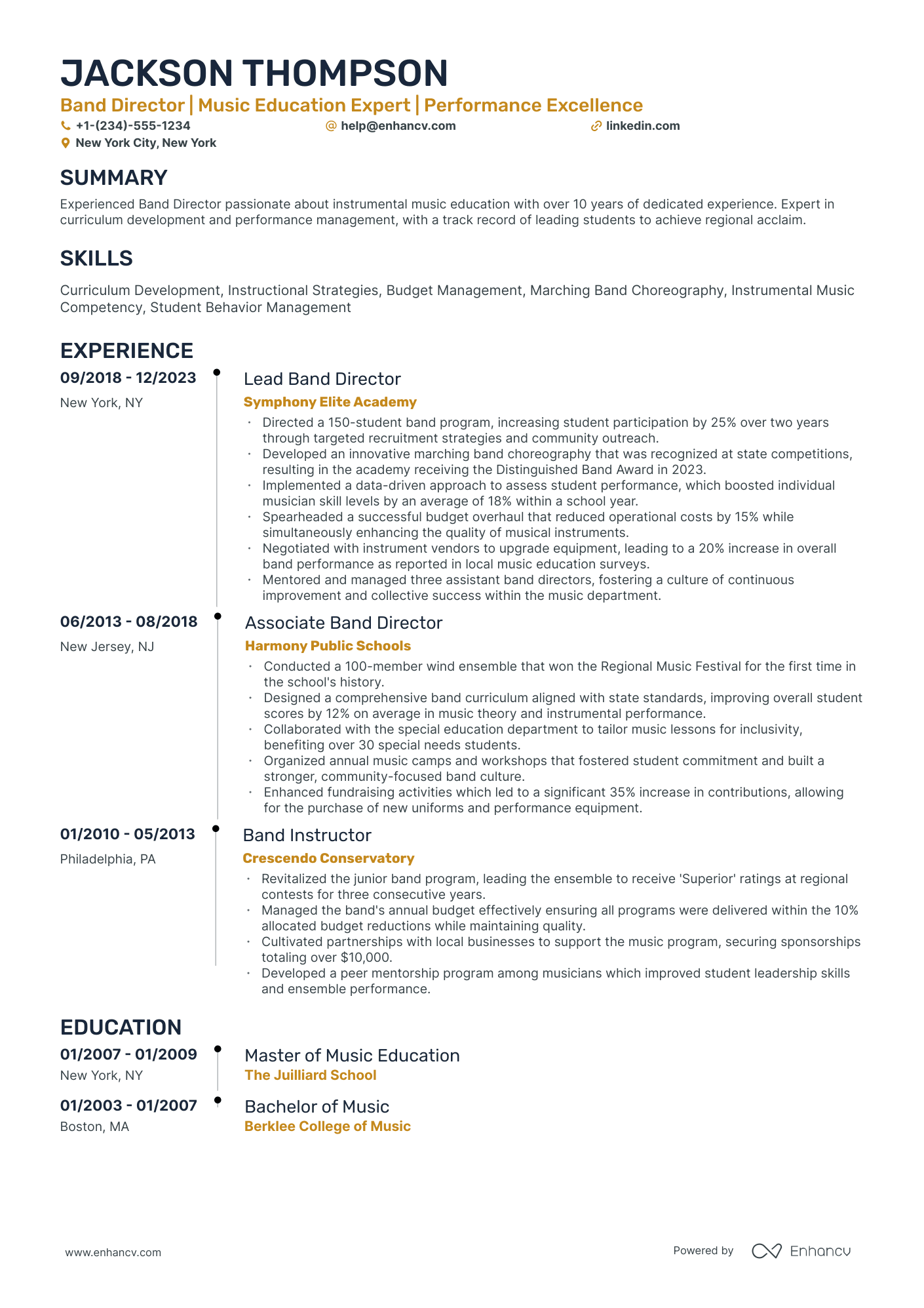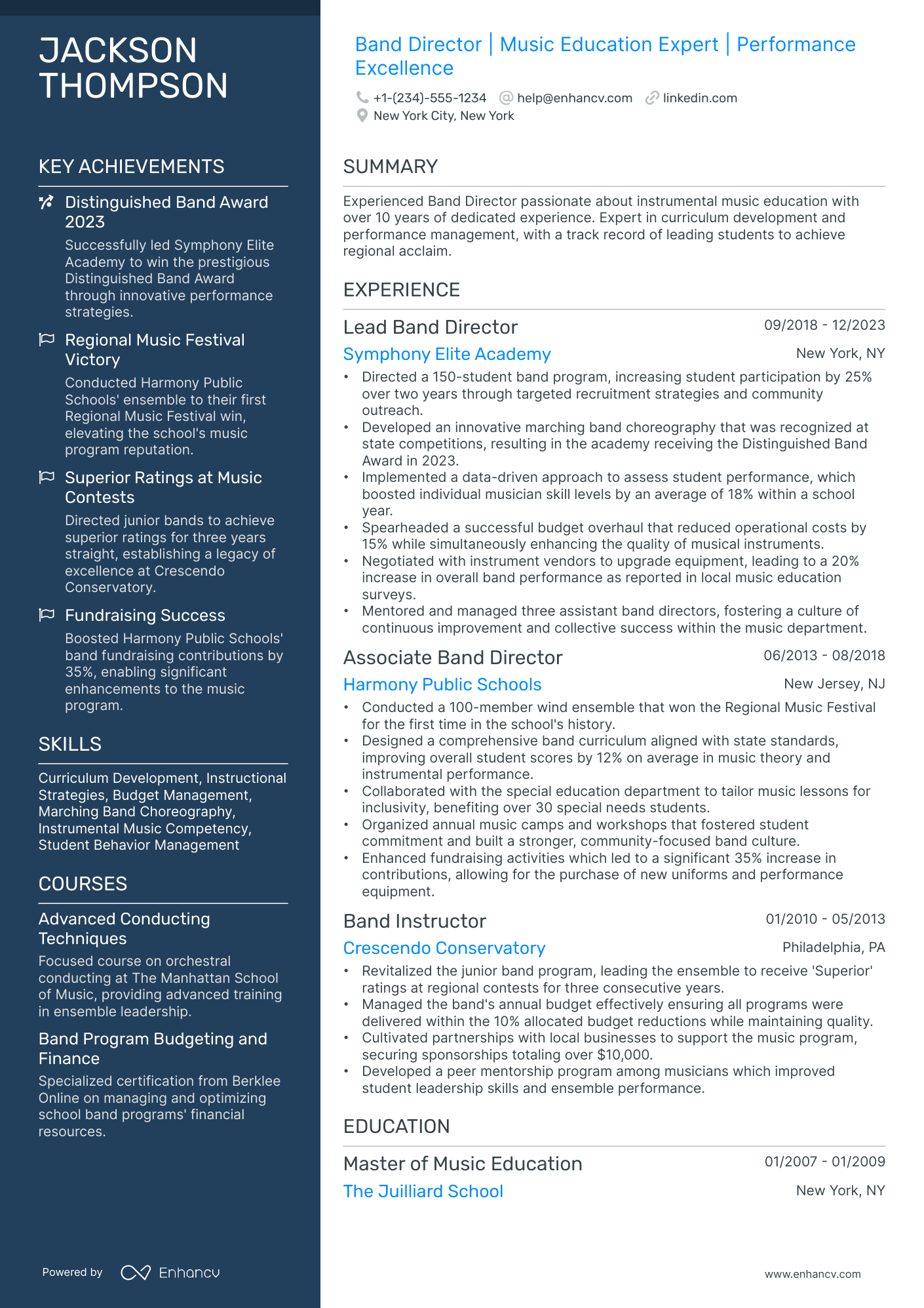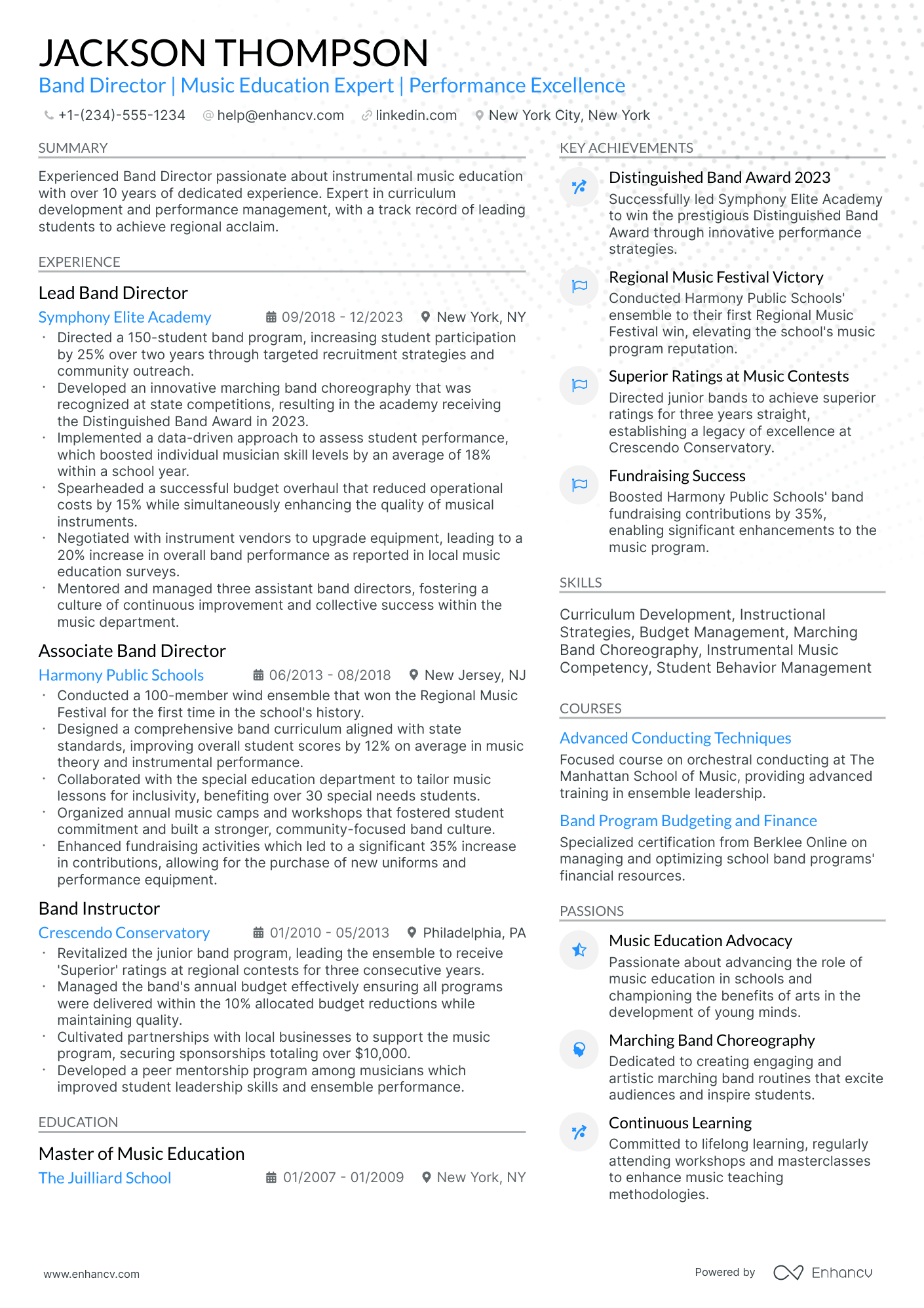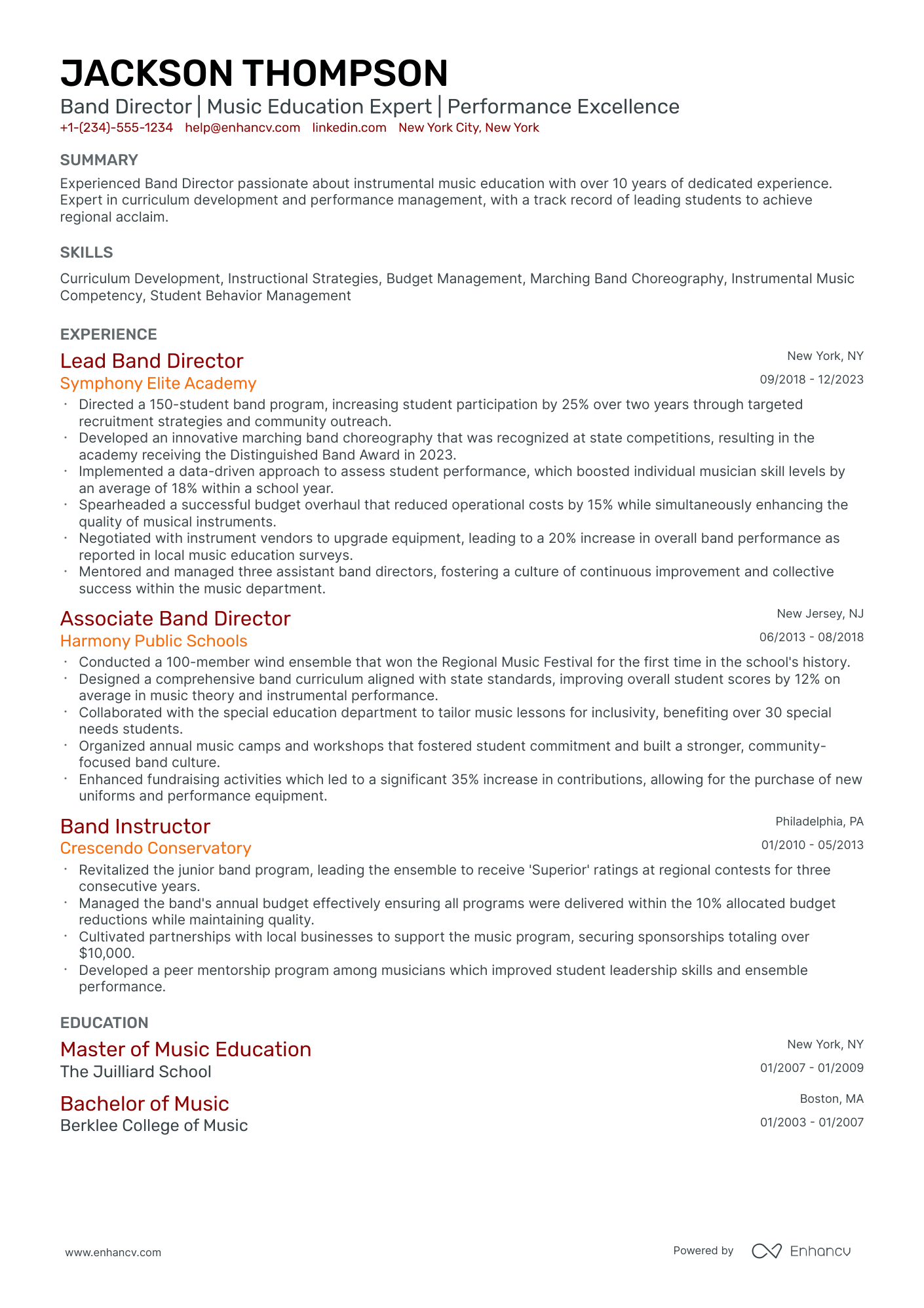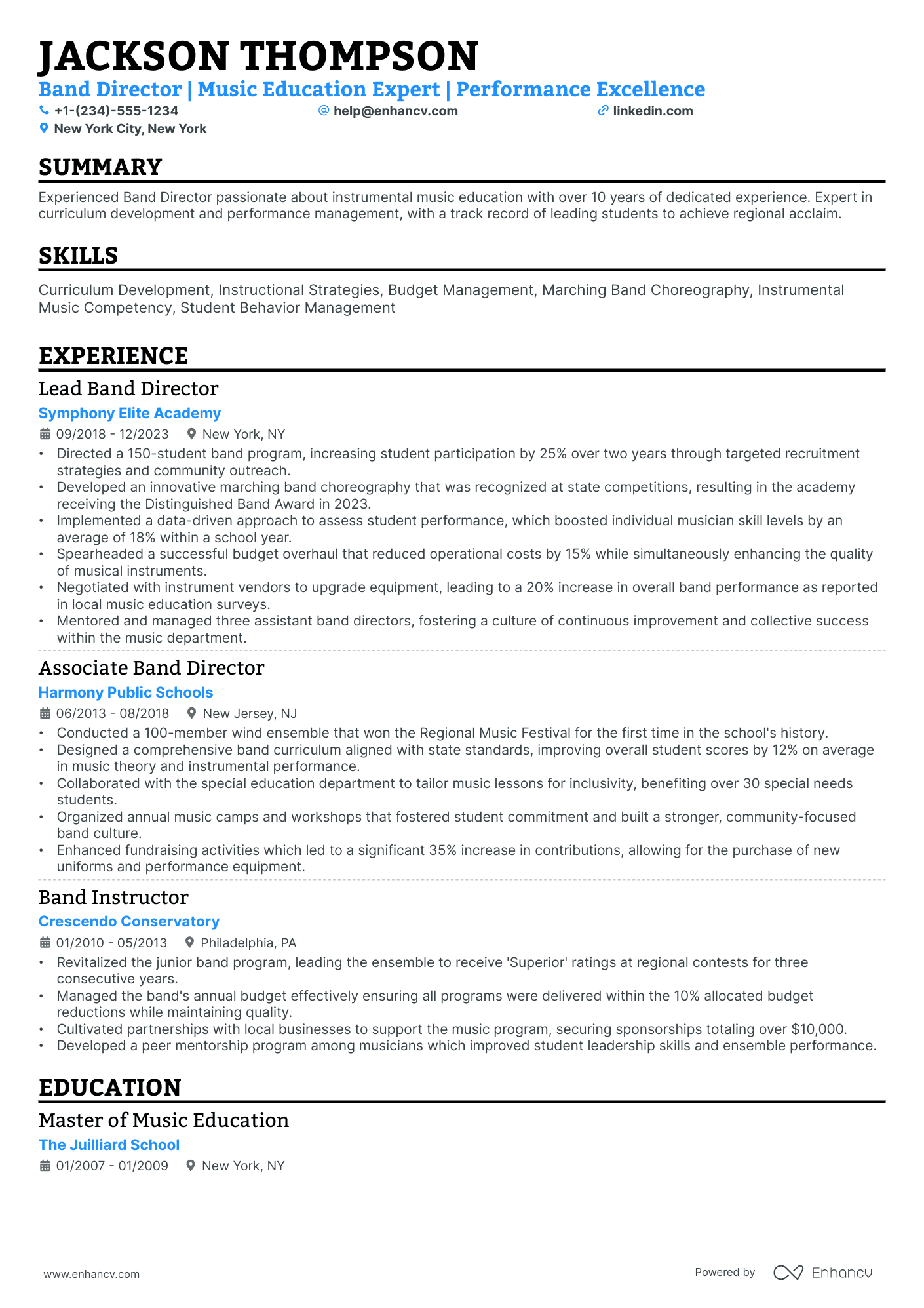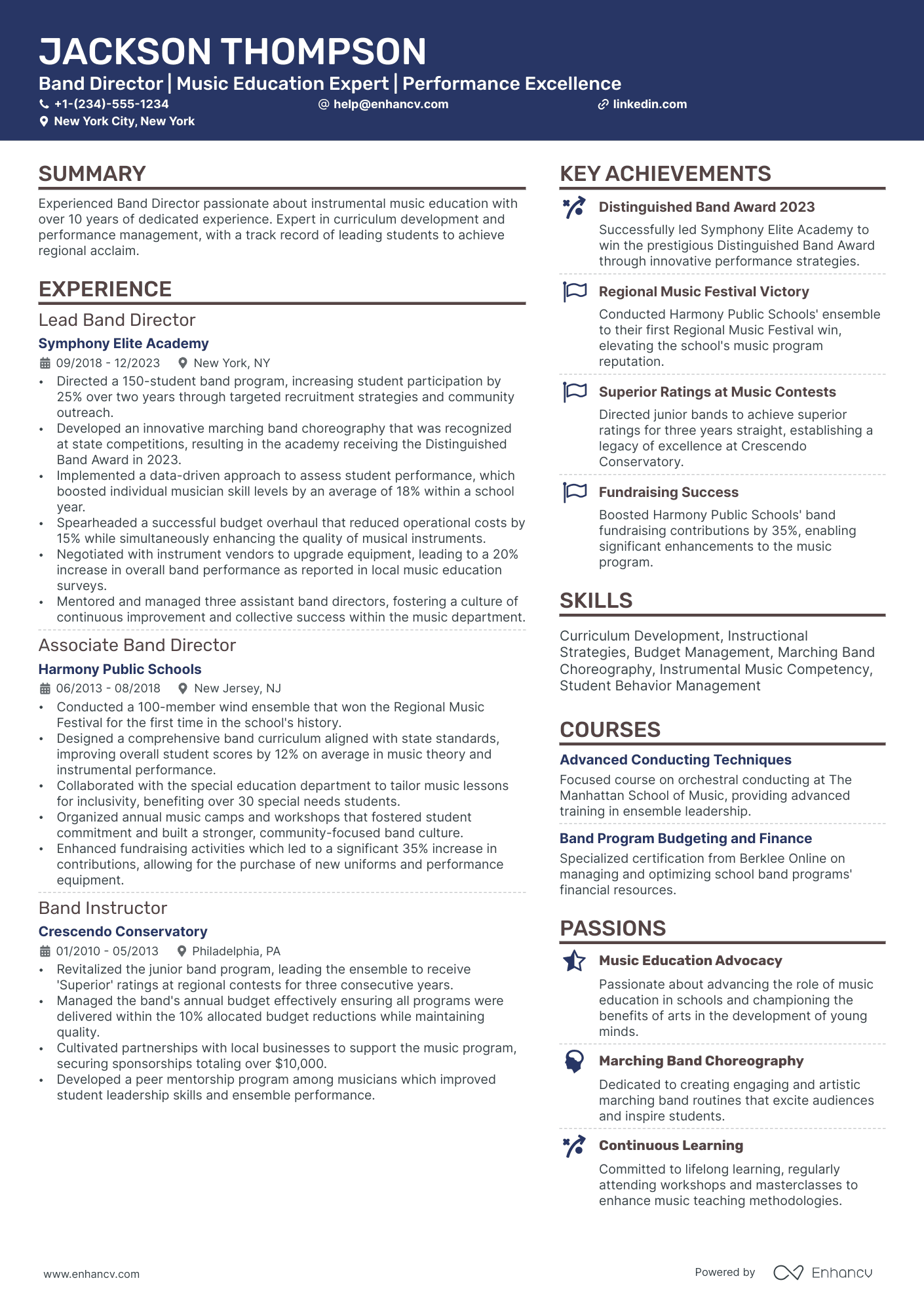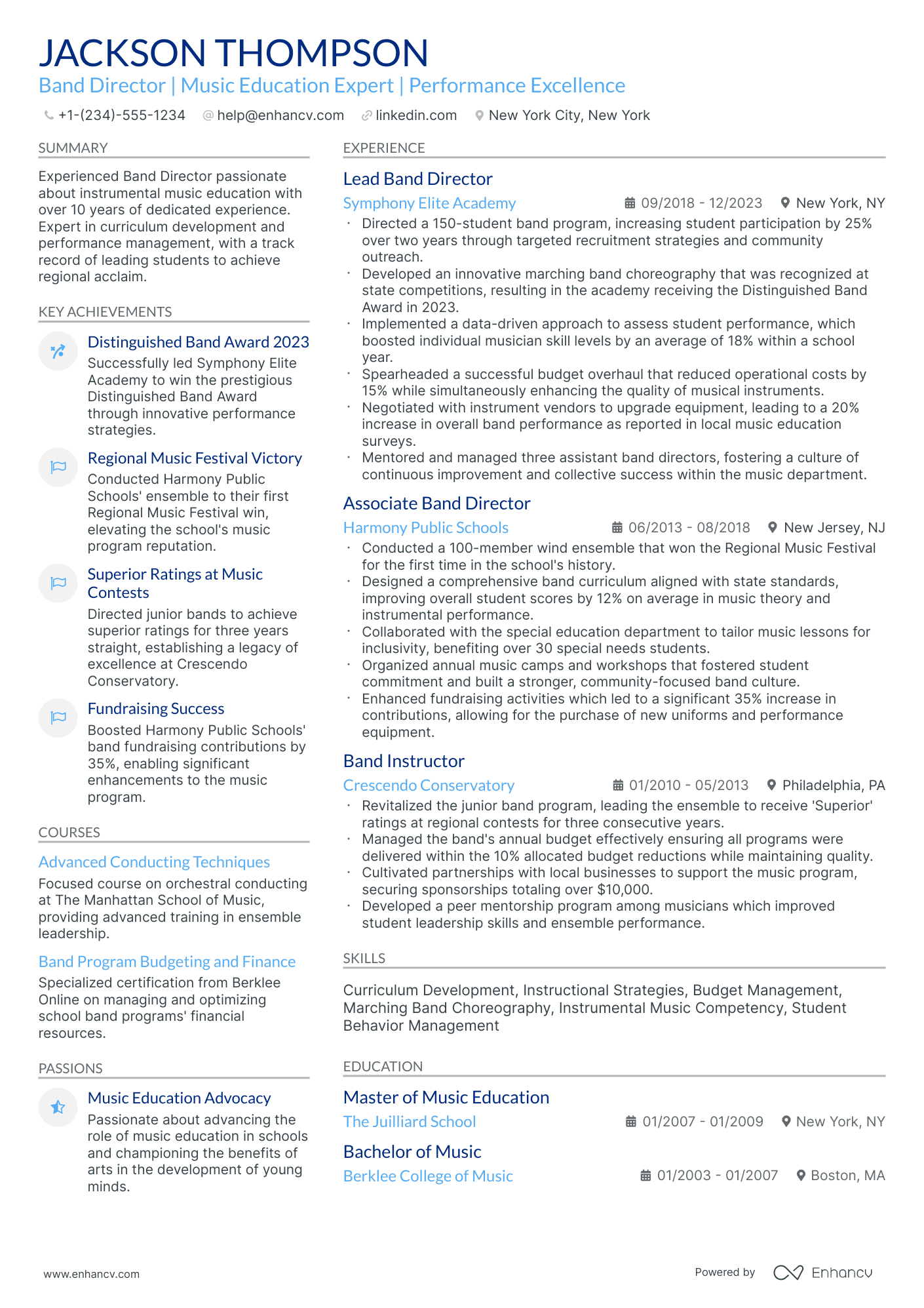As a band director, you may struggle to concisely display your diverse skill set—from musical expertise to leadership abilities—on a single-page resume. Our guide offers targeted advice to streamline your experience, emphasizing your unique qualifications in a format that resonates with music education employers.
- Band director resumes that are tailored to the role are more likely to catch recruiters' attention.
- Most sought-out band director skills that should make your resume.
- Styling the layout of your professional resume: take a page from band director resume examples.
How to write about your band director achievements in various resume sections (e.g. summary, experience, and education).
Professional band director resume format advice
Achieving the most suitable resume format can at times seem like a daunting task at hand.
Which elements are most important to recruiters?
In which format should you submit your resume?
How should you list your experience?
Unless specified otherwise, here's how to achieve a professional look and feel for your resume.
- Present your experience following the reverse-chronological resume format . It showcases your most recent jobs first and can help recruiters attain a quick glance at how your career has progressed.
- The header is the must-have element for your resume. Apart from your contact details, you could also include your portfolio and a headline, that reflects on your current role or a distinguishable achievement.
- Select relevant information to the role, that should encompass no more than two pages of your resume.
- Download your resume in PDF to ensure that its formatting stays intact.
Think about the location of your application – Canadian resumes, for instance, might follow a different structure.
Upload & Check Your Resume
Drop your resume here or choose a file. PDF & DOCX only. Max 2MB file size.
PRO TIP
Listing your relevant degrees or certificates on your band director resume is a win-win situation. Not only does it hint at your technical capabilities in the industry, but an array of soft skills, like perseverance, adaptability, and motivation.
Ensure your band director resume stands out with these mandatory sections:
- Header - the section recruiters look to find your contact details, portfolio, and potentially, your current role
- Summary or objective - where your achievements could meet your career goals
- Experience - showcasing you have the technical (and personal) know-how for the role
- Skills - further highlighting capabilities that matter most to the band director advert and your application
- Certifications/Education - staying up-to-date with industry trends
What recruiters want to see on your resume:
- Proven experience in conducting and directing bands, including successful performances, competitions, and events.
- Strong background in music education and a deep knowledge of music theory, composition, and arrangements appropriate for a variety of band ensembles.
- Leadership skills with the ability to inspire, motivate, and mentor students of varying skill levels, as well as manage assistant directors and staff.
- Experience in developing and implementing band curricula, including the selection of music, designing drills, and overseeing practice sessions.
- Effective communication and organizational skills, with a track record of fostering relationships with students, parents, school administrators, and the community.
What is the resume experience section and how to write one for your past roles
The experience section in a band director resume is critical for your profile and overall application. It should not only display your work history, but also highlight your achievements in previous roles.
Many candidates either simply list their duties or provide excessive details about past, irrelevant jobs. A more effective approach involves first examining the job advertisement for keywords - specifically, skills essential for the role. Then, demonstrate these key requirements throughout different parts of your resume, using accomplishments from your roles.
Format each bullet point in your experience section by starting with a strong action verb. Follow this with a description of your role and its impact on the team or organization.
Aim to include three to five bullet points for each role.
Finally, gain insights into how professionals have crafted their band director resume experience sections by exploring some best practice examples.
- Efficiently orchestrated rehearsals for a 120-member concert band, achieving superior ratings at regional and national competitions.
- Implemented innovative marching techniques and contemporary show themes that increased audience engagement by 40% during halftime shows.
- Secured grants and funding for band program resulting in an upgraded instrument inventory and enhanced performance capabilities.
- Expanded the musical repertoire to include diverse genres, thereby attracting a broader spectrum of students to the band.
- Piloted a peer-mentorship program which improved musician skill levels and fostered a cohesive team environment.
- Facilitated the organization and execution of annual fundraising events, exceeding financial goals by 25% each year.
- Designed a comprehensive summer band camp that increased student recruitment by 30%, showcasing the program's appeal and quality.
- Collaborated with district schools to align music curricula, enhancing continuity and ensuring smooth transitions for students advancing through music programs.
- Trained the jazz ensemble to award-winning levels, achieving first place at the State Jazz Championships.
- Revitalized the marching band's visual and musical presentation, significantly improving the performance scores at competitions by an average of 15 points.
- Established strong relationships with local businesses for sponsorships that provided new uniforms and equipment for the band.
- Mentored student leaders to take on more responsibilities within the band, promoting a culture of student-led initiatives and self-improvement.
- Successfully increased band membership by 20% through targeted recruitment efforts and engaging community outreach programs.
- Streamlined rehearsal schedules and introduced a digital resource library for part learning, improving individual musicianship and group cohesion.
- Coordinated with other fine arts programs to create interdisciplinary performances, enriching the cultural atmosphere of the school.
- Conducted multiple successful concerts and events, enhancing the school's reputation within the local and national arts community.
- Developed a student leadership program which involved students in decision-making processes and leadership roles within the band.
- Secured performance opportunities at notable venues, providing students with professional level experiences and exposure.
- Instituted an audiovisual recording system for rehearsals, allowing for more effective feedback and rapid improvement among musicians.
- Led the band in receiving the 'Outstanding Band Award' at a prestigious national festival, raising the school's profile within the academic music community.
- Developed and maintained a community partnership program that involved local musicians in the educational process, expanding students' network and learning opportunities.
- Directed a comprehensive marching band program encompassing performance, choreography, and competition attendance, leading to increased recognition and awards.
- Overhauled the music library to include a variety of styles and difficulties, catering to a wide range of student abilities and interests.
- Instigated a collaborative concert series with other arts departments, fostering a sense of community and enhancing overall student involvement.
- Increased student participation in the band by 25% through the introduction of a mentoring system pairing experienced players with beginners.
- Pioneered a digital sheet music initiative, which improved access to a variety of compositions and reduced the environmental impact of the program.
- Engaged in extensive community outreach, including performances at local events, which boosted public support and attendance at school concerts.
- Cultivated a culture of performance excellence that led to a 100% increase in students auditioning for all-state music ensembles.
- Implemented a yearly 'Band Clinic Day' where professional musicians and educators provided workshops, master classes, and clinics to students.
- Fostered a partnership with a local symphony orchestra to facilitate student access to professional concerts and educational opportunities.
The following content includes information from "O*NET OnLine" by the U.S. Department of Labor, Employment and Training Administration (USDOL/ETA). Used under the CC BY 4.0 license. The data represents the top responsibilities present on the task lists for band director professionals.
Top Responsibilities for Band Director:
- Prepare materials and classrooms for class activities.
- Observe and evaluate students' performance, behavior, social development, and physical health.
- Instruct through lectures, discussions, and demonstrations in one or more subjects, such as English, mathematics, or social studies.
- Prepare, administer, and grade tests and assignments to evaluate students' progress.
- Establish and enforce rules for behavior and procedures for maintaining order among students.
- Establish clear objectives for all lessons, units, and projects, and communicate these objectives to students.
- Assign lessons and correct homework.
- Assist students who need extra help, such as by tutoring and preparing and implementing remedial programs.
- Confer with parents or guardians, other teachers, counselors, and administrators to resolve students' behavioral and academic problems.
- Maintain accurate, complete, and correct student records as required by laws, district policies, and administrative regulations.
Quantifying impact on your resume
- Quantify the number of student musicians managed within the band to demonstrate leadership scale and organizational skills.
- Highlight the percentage increase in the band's competition scores under your direction, showing measurable improvement in performance.
- Detail the number of concerts, competitions, or events coordinated yearly to showcase event management experience.
- Specify the amount of budget overseen for band operations to illustrate financial management capability.
- List any fundraising efforts that you led, noting the dollar amount raised, to reflect your ability to generate resources.
- Mention the growth in band membership during your tenure, providing specific percentages to indicate recruiting success.
- Document the number of new pieces or programs you introduced, emphasizing innovation and curricular development.
- Describe the ratio of students who have gone on to pursue music in higher education or professional settings, underscoring your mentorship effectiveness.
Action verbs for your band director resume
Experience section for candidates with zero-to-none experience
While you may have less professional experience in the field, that doesn't mean you should leave this section of your resume empty or blank.
Consider these four strategies on how to substitute the lack of experience with:
- Volunteer roles - as part of the community, you've probably gained valuable people (and sometimes even technological capabilities) that could answer the job requirements
- Research projects - while in your university days, you may have been part of some cutting-edge project to benefit the field. Curate this within your experience section as a substitute for real-world experience
- Internships - while you may consider that that summer internship in New York was solely mandatory to your degree, make sure to include it as part of your experience, if it's relevant to the role
- Irrelevant previous jobs - instead of detailing the technologies you've learned, think about the transferable skills you've gained.
Recommended reads:
PRO TIP
List all your relevant higher education degrees within your resume in reverse chronological order (starting with the latest). There are cases when your PhD in a particular field could help you stand apart from other candidates.
Shining a light on your band director hard skills and soft skills
To win recruiters over, you must really have a breadth of skill set presented and supported within your band director resume.
On hiring managers' checklists, you'd initially discover hard or technical skills. Those are the technology (and software) that help you perform on the job. Hard skills are easy to quantify via your education, certificates, and on-the-job success.
Another main criterion recruiters are always assessing your band director resume on is soft skills. That is your ability to communicate, adapt, and grow in new environments. Soft skills are a bit harder to measure, as they are gained both thanks to your personal and professional experience.
Showcase you have the ideal skill set for the role by:
- Dedicating both a skills box (for your technical capabilities) and an achievements or strengths section (to detail your personal skills).
- When listing your skills, be specific about your hard skills (name the precise technology you're able to use) and soft skills (aim to always demonstrate what the outcomes were).
- Avoid listing overused cliches in the skills section (e.g. Microsoft Office and Communication), unless they're otherwise specified as prominent for the role.
- Select up to ten skills which should be defined via various sections in your resume skills sidebar (e.g. a technical skills box, industry expertise box with sliders, strengths section with bullets).
Spice up your resume with leading technical and people skills, that'd help you get noticed by recruiters.
Top skills for your band director resume:
Music Composition Software
Sheet Music Editing Tools
Audio Recording Equipment
Sound Mixing Software
Digital Audio Workstations (DAWs)
Conducting Techniques
Instrument Proficiency
Music Theory Knowledge
Score Analysis Tools
Performance Assessment Tools
Leadership
Communication
Teamwork
Patience
Creativity
Time Management
Problem-Solving
Adaptability
Motivation
Conflict Resolution
Next, you will find information on the top technologies for band director professonals from "O*NET OnLine" by the U.S. Department of Labor, Employment and Training Administration (USDOL/ETA). Used under the CC BY 4.0 license.
Top technologies for Band Director’s resume:
- Email software
- Microsoft Outlook
- Moodle
- Schoology
- Flipgrid
- Screencastify
PRO TIP
If you happen to have plenty of certificates, select the ones that are most applicable and sought-after across the industry. Organize them by relevance to the role you're applying for.
The importance of your certifications and education on your band director resume
Pay attention to the resume education section . It can offer clues about your skills and experiences that align with the job.
- List only tertiary education details, including the institution and dates.
- Mention your expected graduation date if you're currently studying.
- Exclude degrees unrelated to the job or field.
- Describe your education if it allows you to highlight your achievements further.
Your professional qualifications: certificates and education play a crucial role in your band director application. They showcase your dedication to gaining the best expertise and know-how in the field. Include any diplomas and certificates that are:
- Listed within the job requirements or could make your application stand out
- Niche to your industry and require plenty of effort to obtain
- Helping you prepare for professional growth with forward-facing know-how
- Relevant to the band director job - make sure to include the name of the certificate, institution you've obtained it at, and dates
Both your certificates and education section need to add further value to your application. That's why we've dedicated this next list just for you - check out some of the most popular band director certificates to include on your resume:
The top 5 certifications for your band director resume:
- Music Educator's Certificate (MEC) - National Association for Music Education (NAfME)
- Teacher Certification in Music Education (TCME) - State Departments of Education
- Instrumental Music Teacher Certification (IMTC) - State Departments of Education
- Professional Studies Certificate in Music Education (PSCME) - Various Universities with Music Education Programs
- Master of Music Education Certification (MMEC) - Various Universities with Graduate Music Programs
The content below includes information from "O*NET OnLine" by the U.S. Department of Labor, Employment and Training Administration (USDOL/ETA). Used under the CC BY 4.0 license. The data represents the top associations for band director professionals.
Top US associations for a Band Director professional
- ACSD
- American Choral Directors Association
- American Federation of Teachers, AFL-CIO
- Association for Middle Level Education
- Association of American Educators
PRO TIP
Showcase any ongoing or recent educational efforts to stay updated in your field.
Recommended reads:
Best practices to your band director resume summary or objective
To start, how do you know if you should include a resume summary or a resume objective ?
- Resume summaries are ideal for band director professionals with more experience, who'd like to give a quick glimpse of their biggest career achievements in the top one-third of their resumes.
- On the other hand, resume objectives serve as a road map for recruiters. Candidates use the objective to show how their experience aligns with the band director role they're applying for while showcasing the North Star of their career (or where they want to be as a professional in the next couple of years).
The resume summary or resume objective could be the perfect fit for your band director resume. The function of both is to highlight your professionalism succinctly. So, keep your writing specific: include no more than four sentences and target your application to the role. Here's how these specific resume sections help the band director candidates stand out.
Resume summaries for a band director job
- Accomplished band director with 10 years of experience leading high school marching bands to regional and state competitions. Holds a Master’s in Music Education and excels in curating impactful musical selections that resonate with musicians and audiences alike. Celebrated for increasing student participation by 40% and securing three consecutive state championships.
- Dynamic band director with a robust 15-year history orchestrating college-level symphonic bands, specializing in strategic program development and cross-disciplinary performances. Possesses an in-depth understanding of music theory and pedagogy and has successfully broadened community engagement through innovative concert series resulting in a 50% hike in attendance.
- Seasoned Military Band Leader transitioning into public school music direction with over 20 years of distinguished service. Expert in precision drill routines and advanced musical arrangements, and looks forward to applying a unique blend of leadership and musical expertise to inspire and shape the next generation of artists.
- IT Project Manager aspiring to pivot to band director, bringing 8 years of team leadership and project execution. Combines a lifelong passion for music with PMP certification and proven organizational skills. Aims to harness a fresh perspective and dedication to team-building to foster a stimulating and nurturing environment for student musicians.
- Energetic and passionate recent Music Education graduate aiming to secure a debut role as a band director. Brings a fresh take on music pedagogy, superior conducting abilities, and a steadfast commitment to fostering musical talent. Eager to leverage academic training and a patient, engaging teaching style to make a meaningful impact.
- Aspiring band director and recent university graduate with a degree in Music Performance. Driven to create captivating music programs, seeks to apply advanced skills in brass and woodwind instruments, along with a comprehensive understanding of music theory, to lead and motivate aspiring young musicians in a school setting.
Optimize your resume summary and objective for ATS
Drop your resume here or choose a file.
PDF & DOCX only. Max 2MB file size.
Average salary info by state in the US for band director professionals
Local salary info for Band Director.” Source: My Next Move, National Center for O*NET Development. Accessed 10/15/2024
| State | Average Salary (in USD) |
|---|---|
| US National Average | $64,290 |
| California (CA) | $99,430 |
| Texas (TX) | $63,270 |
| Florida (FL) | $52,090 |
| New York (NY) | $85,310 |
| Pennsylvania (PA) | $76,710 |
| Illinois (IL) | $66,140 |
| Ohio (OH) | $75,420 |
| Georgia (GA) | $73,210 |
| North Carolina (NC) | $50,820 |
| Michigan (MI) | $62,630 |
What else can you add to your band director resume
What most candidates don't realize is that their band director resumes should be tailored both for the job and their own skillset and personality.
To achieve this balance between professional and personal traits, you can add various other sections across your resume.
Your potential employers may be impressed by your:
- Awards - spotlight any industry-specific achievements and recognitions that have paved your path to success;
- Languages - dedicate some space on your band director resume to list your multilingual capabilities, alongside your proficiency level;
- Publications - with links and descriptions to both professional and academic ones, relevant to the role;
- Your prioritization framework - include a "My Time" pie chart, that shows how you spend your at-work and free time, would serve to further backup your organization skill set.
Key takeaways
- Your band director resume is formatted professionally and creates an easy-to-read (and -understand) experience for recruiters;
- You have included all pertinent sections (header, summary/objective, experience, skills, certifications) within your band director resume;
- Instead of just listing your responsibilities, you've qualified them with skills and the results of your actions;
- Within your band director resume, you've taken the time to align specific job requirements with your unique expertise, showcasing the value you can provide as a professional;
- Technologies and personal skills are featured across different sections of your band director resume to achieve the perfect balance.
